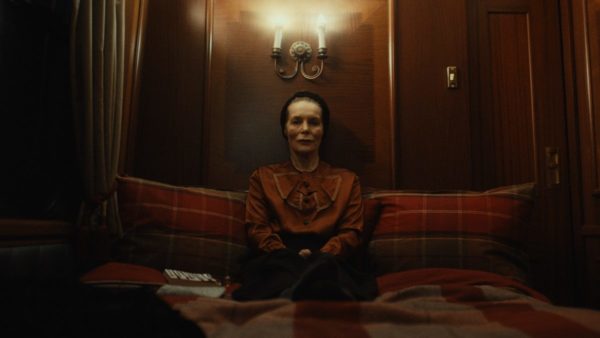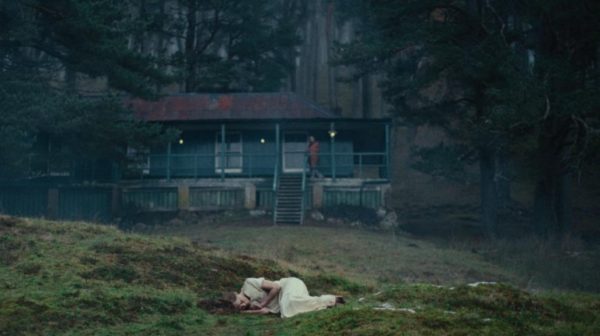
The story of She Will is slight, but the film, from director Charlotte Clbert and co-writer Kitty Percy, more than makes up for it with its visuals.
Successful actress Veronica Ghent (Alice Krige) is travelling by train to a retreat in the Scottish highlands following a double mastectomy. It’s obvious from early on that Veronica is in a great deal of pain – both physical, as well as emotional – but she’s headstrong, brittle and unwilling to ask for help. Krige is a perfect fit for the character: her clipped dialogue, her seamless ability to transition between hard and soft, and her ethereal beauty are crucial to our understanding of who Veronica is.
Accompanying her is a hired nurse, Desi (Kota Eberhardt) who is both compassionate and clearly used to dealing with demanding clients. The relationship between the two women is initially one of friction; (at one point Veronica demands that Desi not treat her like a child and declares that Desi is only there to change her gauze).
Things change once they arrive at the retreat. Veronica mistakenly believed she would be the sole guest, but the main building has been invaded by vacationing wannabe artists who smother her in unwanted attention. The intrusion of others winds up helping to ease the tension between Veronica and Desi, though, and once they set up camp at their own private cottage in the woods, they begin to warm to each other’s presence.
Then Veronica begins to experience hallucinatory dreams.

She Will is deeply informed by the environment and the real life history of the area (Cairngorms and Aviemore), which is revealed to be amass gravesite of thousands of women accused of witchcraft and burned to death. Veronica forms a connection to the land – the mud, the flora, the trees – first in her dreams and then in reality, seemingly in response to her own vulnerability and mortality. Eventually these ties allow her to project herself to new locations, and even use her will to do harm to those who have harmed her, including Malcolm McDowell‘s director character Hathbourne.
This makes She Will sound like a feminist revenge thriller, and while it certainly contains instances of both Veronica and Desi exacting revenge against male oppressors, the film isn’t nearly as linear as that. Such a straightforward reading also dramatically diminishes the visceral impact of the film’s surreal imagery.
Colbert has a clear interest in the surreal, as evidenced by her short ‘The Silent Man’ and her producing credit on a Salvador Dali biopic. That interest shines through here, particularly in Veronica’s dream sequences, which find her observing witches dancing around a giant bonfire, her iris transforming into the cosmos and all kinds of time-lapse montages of the woods. Not only are these repeated sequences compelling, they’re immersive; they embed us in Veronica’s experience as she begins to lose her grip on time and space.
It also makes for some fantastically icky sequences involving creeping, living peat moss. Veronica’s weakened state seemingly opens her up to the power and influence of the woods’ magic, and she amplifies that through tactile engagement: rubbing dirt on her face and chest, stroking plants as she walks and even sleeping outside. In a few dizzying moments of surreal horror, Veronica commands the woods to do her deadly bidding.
It’s eco-horror, but in Colbert’s hands it’s not scary. It’s emotional. There’s an underlying hurt, pain, and trauma infused in both Veronica and Desi’s respective stories: it binds them together, opens them up to nature and the resulting power enables them to wreak feminist revenge.
She Will works best as a captivating audiovisual/sensory experience rather than a (slight) narrative experience. Taken on those terms, it’s an engaging and visceral watch. 3.5/5
She Will played at Fantastic Fest 2021.